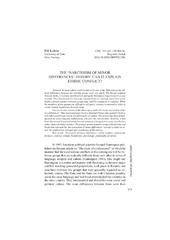The 'narcissism of minor differences' theory : Can it explain ethnic conflict?
Апстракт
In many ethnic conflicts and civil wars in the 20th century the cultural differences between the warring groups were very small. The bloody conflicts between Serbs, Croatians, and Bosnians during the breakup of Yugoslavia are a case in point. This observation has led some commentators to conclude that a lack of objective cultural markers between groups may itself be conducive to violence: When the members of two groups are difficult to tell apart, violence is inserted in order to create identity boundaries between them. One particular version of this theory goes under the name ‘narcissism of minor differences’. This expression goes back to Sigmund Freud, who applied it both to individual psychology and in his philosophy of culture. The notion has been largely ignored by practicing psychotherapists, but over the last decades, however, it has been discovered by journalists and social scientists and applied to cases of collective rather than individual violence. The present article examin...es some of the articles and books that expound the ‘the narcissism of minor differences’-concept in order to assess the explanatory strength and weaknesses of this theory.
Кључне речи:
narcissism of minor differences / ethnic conflict / cultural differences / psihologija / filozofija kultureИзвор:
Filozofija i društvo / Philosophy and Society, 2007, 153-171Издавач:
- Beograd: za filozofiju i društvenu teoriju
Институција/група
IFDTTY - JOUR AU - Kolsto, Pal PY - 2007 UR - http://rifdt.instifdt.bg.ac.rs/123456789/79 AB - In many ethnic conflicts and civil wars in the 20th century the cultural differences between the warring groups were very small. The bloody conflicts between Serbs, Croatians, and Bosnians during the breakup of Yugoslavia are a case in point. This observation has led some commentators to conclude that a lack of objective cultural markers between groups may itself be conducive to violence: When the members of two groups are difficult to tell apart, violence is inserted in order to create identity boundaries between them. One particular version of this theory goes under the name ‘narcissism of minor differences’. This expression goes back to Sigmund Freud, who applied it both to individual psychology and in his philosophy of culture. The notion has been largely ignored by practicing psychotherapists, but over the last decades, however, it has been discovered by journalists and social scientists and applied to cases of collective rather than individual violence. The present article examines some of the articles and books that expound the ‘the narcissism of minor differences’-concept in order to assess the explanatory strength and weaknesses of this theory. PB - Beograd: za filozofiju i društvenu teoriju T2 - Filozofija i društvo / Philosophy and Society T1 - The 'narcissism of minor differences' theory : Can it explain ethnic conflict? SP - 153 EP - 171 DO - 10.2298/FID0702153K ER -
@article{
author = "Kolsto, Pal",
year = "2007",
abstract = "In many ethnic conflicts and civil wars in the 20th century the cultural differences between the warring groups were very small. The bloody conflicts between Serbs, Croatians, and Bosnians during the breakup of Yugoslavia are a case in point. This observation has led some commentators to conclude that a lack of objective cultural markers between groups may itself be conducive to violence: When the members of two groups are difficult to tell apart, violence is inserted in order to create identity boundaries between them. One particular version of this theory goes under the name ‘narcissism of minor differences’. This expression goes back to Sigmund Freud, who applied it both to individual psychology and in his philosophy of culture. The notion has been largely ignored by practicing psychotherapists, but over the last decades, however, it has been discovered by journalists and social scientists and applied to cases of collective rather than individual violence. The present article examines some of the articles and books that expound the ‘the narcissism of minor differences’-concept in order to assess the explanatory strength and weaknesses of this theory.",
publisher = "Beograd: za filozofiju i društvenu teoriju",
journal = "Filozofija i društvo / Philosophy and Society",
title = "The 'narcissism of minor differences' theory : Can it explain ethnic conflict?",
pages = "153-171",
doi = "10.2298/FID0702153K"
}
Kolsto, P.. (2007). The 'narcissism of minor differences' theory : Can it explain ethnic conflict?. in Filozofija i društvo / Philosophy and Society Beograd: za filozofiju i društvenu teoriju., 153-171. https://doi.org/10.2298/FID0702153K
Kolsto P. The 'narcissism of minor differences' theory : Can it explain ethnic conflict?. in Filozofija i društvo / Philosophy and Society. 2007;:153-171. doi:10.2298/FID0702153K .
Kolsto, Pal, "The 'narcissism of minor differences' theory : Can it explain ethnic conflict?" in Filozofija i društvo / Philosophy and Society (2007):153-171, https://doi.org/10.2298/FID0702153K . .


